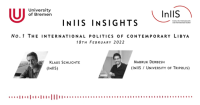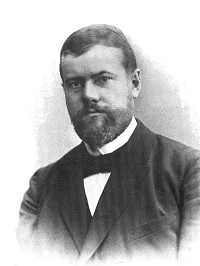News
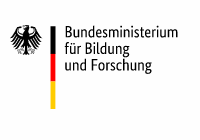
Das Projekt untersucht die Wissensproduktion in der deutschen Friedens- und Konfliktforschung zu den Kriegen und Interventionen in Afghanistan und Somalia. Dabei geht es vor allem um die Fragen, ob und in welcher Weise dieses Wissen Eingang in die Sicherheitspolitik der Bundesrepublik eingegangen ist. Das Projekt ist eine Kooperation mit der Universität Erfurt (Prof. Dr. Sophia Hoffmann) und Kiel (Prof. Dr. Dirk Nabers, Dr. Frank Stengel). Am InIIS wird die Forschung zum Fall Somalia/AMISOM von Dr. Jude Kagoro und Prof. Dr. Klaus Schlichte ab April 2022 durchgeführt. Die vierjährige Förderung erfolgt im Rahmen des BMBF-Programms "Kompetenznetzwerke der Friedens- und Konfliktforschung".
 Abbildung: Stift und Papier
Abbildung: Stift und Papier
ECPR General Conference 2021, 31 August – 3 September 2021, University of Innsbruck, Austria
Chairs: Kressen Thyen (University of Bremen) & Alex Veit (University of Bremen)
Endorsed by the ECPR Standing Group on Political Economy and Welfare State Politics
In recent years, scholars of welfare state politics and social policy have paid increasing attention to internationalised welfare as a field of study. In contrast to the traditional welfare state literature which conceptualizes social policy primarily as a national issue, this relatively new branch of scholarship emphasises the influence of global dynamics and international entanglements on both social needs and welfare provision. Elements of internationalisation include a broad range of factors, from imperial legacies, globalized economies and geopolitical dependency to internationally fostered and financed social policy designs and benchmarking practices. These factors are particularly influential, but not limited to, welfare states in the Global South.
Different strands of research have contributed to our knowledge of internationalised welfare. Phenomena of internationalised welfare have been described in the fields of social history, international political economy, development studies, and public policy/global social policy. Also, more practice-oriented research on poverty reduction research, global health and humanitarian aid have contributed immensely. These research fields, however, are often too disconnected to bring forth collectively shared understandings of internationalised welfare.
Bringing these different strands of research together, this section seeks to advance empirical and theoretical discussions about internationalised welfare. Doing so, we aim to highlight continuities and changes in internationalised welfare from the ‘age of empires’ to the present period of ‘global social governance’. Specifically, we ask: How do global challenges and international political structures – from imperial rule to global governance – impact on national and local welfare institutions? What role do international and transnational actors play in the design, finance and provision of welfare systems? Which ideas and interests drive such involvement? Finally, how does internationalisation impact on state-society relations and collective expectations of the (welfare) state?
To address the above questions, we invite panels and papers from various disciplinary, geographical, and methodological backgrounds. We specifically encourage, but are not limited to, contributions focusing on welfare systems in late-developing and less industrialised economies as well as on international responses to welfare state crises.
How to submit your panel or paper
The section presently consists of four initial panels (abstracts below). We welcome individual paper proposals to these panels. To facilitate planning, please send your paper abstract by email to the section chairs by January 31, 2021.
Additional panel proposals, complete with 3-5 papers, and additional individual papers, are equally welcome. These should be submitted to the ECPR online platform by February 10, 2021: https://ecpr.eu/Events/Event/SectionDetails/1129
For any questions, please contact section chairs Alex Veit (veit@uni-bremen.de) or Kressen Thyen (thyen@uni-bremen.de).
Initial panels
From Imperial to Post-Imperial Welfare Policies: Continuities and Changes
Panel Chairs: Roy Karadag (karadag@uni-bremen.de) & Alex Nadège Ouedraogo (ouedraogo@uni-bremen.de)
This panel targets the imperial sources of internationalised welfare. It aims to bring together scholars who investigate and critically reflect upon the ideas, policy measures and practices of empires in identifying, problematizing and dealing with poverty, social crises and contestations from excluded groups across global peripheries. What were the features of this imperial wave of global social policy? Under which conditions did imperial politicians, bureaucrats and academics engage with teaching, healing and nurturing subject populations in colonies and protectorates? In which ways were these policies and practices themselves transformed in the late imperial years after the Second World War? What were the overall consequences for social policy making after decolonisation had finally materialised?
Organised around this set of questions, contributions ideally bridge the gap between themes of dependent development and the politics of empire, on the one hand, and of welfare statism and social policy, on the other hand. In particular, the goal is to theorise what the ‘imperial’ is in ‘imperial social policy and welfare’. Geographically, we invite papers that cover African, Middle Eastern and Asian contexts of imperial rule. With regard to policy fields, papers may cover anything from education, health, food, labour, pensions, housing and social assistance schemes. Contributions may render the multi-sited and multi-causal nature of imperial policy making visible, for example by investigating the various imperial justifications of policies and regulations, and the contestations they produced both within and beyond the respective imperial institutions.
Welfare in theGlobal South: Between Popular Contention, Statebuilding and Internationalisation
Panel Chair: Alex Veit (veit@uni-bremen.de)
This panel interrogates postcolonial welfare states in the Global South as processes and products of entanglement between domestic, international and transnational political configurations.
On the national level, public welfare connects state organizations and social groups. It may increase state legitimacy, but also trigger new demands. It addresses social inequality, but also manifests group privileges. It symbolises nationhood and provides vision, but also exposes gaps between ambition and implementation. Geographically, welfare bureaucracies embody the state in the most remote village, but also reproduce urban-rural divides. Welfare administrative knowledge is the backbone of planning for the public good, but such data can also be used as a tool of control and repression. In sum, welfare provision creates colourful, often contradictory bonds between states and populations.
At the same time, welfare states of the Global South are strongly internationalised. The design, finance, and provision of welfare is a complex process in which international organisations, bilateral donors, transnational NGOs, religious organisations and expert communities are centrally involved. While such international involvement arguably creates a “global social policy” in its infancy, it also renders concepts of sovereignty, citizenship, democracy, accountability, entitlement, and durability highly precarious. This fundamentally puts into question previous assumptions on welfare state formation.
To address these processes of entanglement between international, transnational and domestic configurations, we invite papers addressing or relating to the following questions: How can we conceptualise welfare in the Global South? How does internationalisation impact on everyday patterns of legitimation and contestation? In what ways did neoliberalism and structural adjustments disrupt postcolonial welfare politics? Where do countervailing ideas emerge against dominant welfare approaches?
Globalisation and Social Questions in the Countryside
Panel Chairs: Klaus Schlichte (klaus.schlichte@uni-bremen.de) & Anna Wolkenhauer (anna.wolkenhauer@uni-bremen.de)
A lot is going on in the countryside. In recent years, Sociology, Development Studies and Political Science have paid renewed attention to rural areas for a number of reasons. Deteriorating food security, increasingly frequently felt impacts of climate change, and a growing awareness of sustainability issues have put farmers back at the centre of attention.
Practices like land-grabbing, the depletion of natural resources, food insecurity or huge gaps in public service delivery seem to fuel forms of opposition that have hitherto rather been ignored by “capital IR”. This panel aims at interrogating social questions that specifically address rural areas, rural populations and internationalised politics targeting them. This can include social policies, rural development, food policies or other schemes geared by “the will to improve” (Tanya Li). While locally effective, state and non-state policies are embedded in a global system of development initiatives, governance structures, trade rules, and political representation more widely. We are convinced that IR is well-advised not to ignore the connections between rural change and international structures – historical and contemporary.
This panel invites contributions from IR and other disciplines related to the following questions: How are structural transformations in the countryside addressed by (internationalised) welfare? How have state retrenchment and a neoliberal redefinition of social policy affected rural areas? How are social and political questions related in the countryside; do welfare and political representation interact? What potential do food security interventions hold for social inclusion and transformation?
Climate Change and Poverty: Vulnerable Populations, Human Security & Social Justice
Panel Chair: Simon Chin-Yee (s.chin-yee@ucl.ac.uk)
Climate change plays an increasingly important role in discussions of poverty, human security and socio-economic risks. Vulnerable populations are increasingly susceptible to weather shocks, desertification, sea level rise and conflicts which can lead to poverty traps. Sustained eradication of poverty will depend on many socio-economic conditions, including access to health care, education and economic growth. Climate change impacts on poverty exponentially as vulnerable populations are more exposed to its effects and have less capacity to adapt or react to natural disasters. Additionally, climate change is increasingly seen as a threat multiplier further exacerbating impacts on human security. These are human rights and climate justice issues.
This panel seeks to examine how changing environmental conditions are impacting vulnerable populations with an eye to the future, answering questions such as: How can vulnerable communities avoid falling into the poverty trap? How do populations cope when experiencing negative shocks in multiple channels simultaneously? What responsibility does the global climate regime have to address issues of human rights and vulnerable populations? To what extent are climate related risks addressed by internationalised social policy-making?
Klischeehafter Blick auf Afrika
07.07.2020Corona im Globalen Süden
22.04.2020 Prof. Dr. Klaus Schlichte
Prof. Dr. Klaus SchlichteMangelnde Ressourcen im Gesundheitssystem, ausbleibender Tourismus und der massive Rückgang von Überweisungen der Arbeiter*innen, die im Ausland arbeiten sind drei Probleme, mit denen die Länder des Globalen Südens zu kämpfen haben.
In Ihrer Reihe "Podcast PolitikWissen" führte die Universität Innsbruck am 21.04. ein Telefoninterview mit Prof. Klaus Schlichte (ca. 35 Min.).
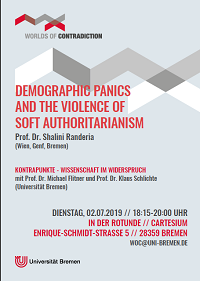 Plakat für den Vortrag und Workshop mit Shalini Randeria
Plakat für den Vortrag und Workshop mit Shalini RanderiaÖffentlicher Vortrag mit Workshop
Das Programm und das Plakat zum Herunterladen (PDF).
Vortrag von Shalini Randeria | Wien, Genf, Bremen
Demographic Panics and the Violence of Soft Authoritarianism
mit Michael Flitner und Klaus Schlichte | Bremen
02.07.19 | Dienstag | 18:00 - 20:00 Uhr | Rotunde (Cartesium), Uni Bremen
Workshop mit Shalini Randeria und Ranabir Samaddar | Calcutta Research Group
Soft Authoritarianism, Primitive Accumulation and the Law
Moderation: Martin Nonhoff | Bremen
03.07.19 | Mittwoch | 10:30 - 14:30 Uhr |UNICOM 7.2210 (InIIS, Mary-Somerville-Straße 7, Haus Wien)
Für den Workshop wird um Anmeldung unter woc@uni-bremen.de gebeten.
Beide Veranstaltungen finden in englischer Sprache statt.
The lecture will address the politics of demographic panics which we are currently observing across the globe and which are entangled with geo-political interests and the increasing strength of ethno-national
identities. Imaginations of the purity of the nation coupled with perceptions of differential fertility rates fuel pro-natalist discourses and policies especially in Eastern Europe, which is also witnessing a strong antifeminist backlash. The same mix of factors, however, lead to selective anti-natalism for the poor and for
religious minorities in India, for example, where a model of economic development based on neo- Malthusian premises continues to animate a state-driven population control program. The links between soft authoritarianism and the demographic imagination in different regions of the world will be explored to delineate the intimate ties between body politics and the body politic. Contemporary dynamics of the governance of reproduction in a world imagined as simultaneously under-populated and over-populated will be considered against the background of the global history of (post)-colonial population control.
Shalini Randeria, Professorin für Sozialanthropologie und Soziologie, ist seit Januar 2019 Excellence Chair der Universität Bremen. Sie ist Rektorin des Instituts für die Wissenschaften vom Menschen in Wien und lehrt am Graduate Institute for International and Development Studies in Genf, wo sie auch das Albert Hirschman Centre on Democracy leitet. In Bremen baut sie im Rahmen der interdisziplinären Forschungsplattform „Worlds of Contradiction“ (WoC) an der Schnittstelle von Kultur-, Rechts- und Sozialwissenschaften eine Forschungsgruppe zu „Soft Authoritarianism“ auf.
Zum Workshop am Folgetag sind alle ganz herzlich eingeladen, insbesondere Nachwuchswissenschaft*innen (MA, PhD und Postdoc).
Lektüre zur Vorbereitung:
Randeria, Shalini. (2007). “The State of Globalization: Legal Plurality, Overlapping Sovereignties and Ambiguous Alliances between Civil Society and the Cunning State in India”. Theory, Culture & Society 24
(1): 1–33.
In deutscher Fassung: Randeria, Shalini. (2006). „Rechtspluralismus und überlappende Souveränitäten: Globalisierung und der »listige Staat« in Indien“, Soziale Welt 57: 229-258
Der öffentliche Vortrag und der Workshop werden von WoC gemeinsam mit dem Institut für Interkulturelle und Internationale Studien und dem Institut für Ethnologie und Kulturwissenschaft der Universität Bremen
veranstaltet. Sie sind Teil des Kolloquiums für Politische Theorie.
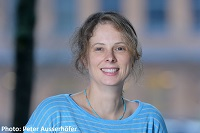 Prof. Dr. Kerstin Martens
Prof. Dr. Kerstin MartensDie Deutsche Forschungsgemeinschaft (DFG) hat einen neuen Sonderforschungsbereich (SFB) "Globale Entwicklungsdynamiken von Sozialpolitik" an der Universität Bremen bewilligt. Der SFB wird in den nächsten vier Jahren mit rund elf Millionen Euro gefördert.
Der SFB wurde federführend von Wissenschaftlerinnen und Wissenschaftlern des SOCIUM (Forschungszentrum Ungleichheit und Sozialpolitik) und des InIIS beantragt. Sprecher wird Professor Herbert Obinger (SOCIUM) sein. Maßgeblich beteiligt an der Antragstellung war aus dem InIIS Prof. Dr. Kerstin Martens, die auch Mitglied des Sprecherteams sein wird.
Die Forschung zur Sozialpolitik hat sich stark auf den Vergleich der hochindustrialisierten Länder konzentriert. Im neuen Sonderforschungsbereich werden die Entwicklungsdynamiken staatlich verantworteter Sozialpolitik in einer auch den Globalen Süden umfassend einbeziehenden Perspektive analysiert. Auch in weiteren Hinsichten geht das Forschungsprogramm des SFBs über die bisherige Sozialpolitikforschung hinaus. Die internationalen Verbindungen und Vernetzungen rücken in den Vordergrund. Die Sozialpolitik eines Landes lässt sich nicht allein aus den innerstaatlichen Verhältnissen heraus erklären. Handelsbeziehungen, Migration, Krieg und Kolonialismus sowie die weltweite Verbreitung von Ideen und Rechtsregeln besitzen eine große Bedeutung für die sozialpolitischen Entwicklungen in den einzelnen Ländern. Zudem liegt der Forschung im SFB ein breites Verständnis von Sozialpolitik zugrunde, in dem unter anderem Bildungspolitik einbezogen wird. Drittens ersetzt der SFB die nationalstaatliche Binnenorientierung der Sozialpolitikforschung durch einen interdependenzentrierten Ansatz.
Der Forschungsverbund hat 15 Teilprojekte und gliedert sich in zwei Projektbereiche.
Der Projektbereich A:“Globale Entwicklungsdynamiken“ besteht aus sechs Teilprojekten, die die Entwicklungsdynamiken in den einzelnen Feldern der Sozialpolitik weltweit untersuchen und eine alle Felder umfassende Datenbank "Global Welfare State Information System" (WeSIS) aufbauen. Aus dem InIIS leitet Prof. Kerstin Martens zusammen mit Prof. Michael Windzio das Teilprojekt „Globale Entwicklung, Diffusion und Transformation von Bildungssystemen“.
Der Projektbereich B „Transregionale Entwicklungsdynamiken“ untersucht in fallstudienzentrierten, qualitativen Analysen die Kausalpfade zwischen internationalen Verflechtungen und sozialpolitischen Entwicklungsdynamiken für einzelne Ländergruppen. Hier ist das InIIS an drei Projekten beteiligt:
- „Mechanismen der Verbreitung von Sozialpolitik“ unter der Leitung von Frank Nullmeier (SOCIUM), Klaus Schlichte (InIIS) und Delia González de Reufels (Institut für Geschichtswissenschaft)
- „Offene Wohlfahrtsstaaten? Die soziale Absicherung von Arbeitsmigration und ihre Rückwirkung auf nationale Politik“ unter der Leitung von Prof. Susanne K. Schmidt (InIIS)
- Transnationale Wohlfahrt: Aufstieg, Zerfall und Renaissance der Sozialpolitik in Afrika“ unter der Leitung von Prof. Klaus Schlichte und Dr. Alex Veit (beide InIIS).
Neben dem InIIS und dem SOCIUM sind von der Universität Bremen auch das Institut für Geschichtswissenschaft, dem Institut für Geographie, das Institut Arbeit und Wirtschaft (IAW), das Zentrum für europäische Rechtspolitik sowie die Arbeitsgruppe Informationsmanagement des Fachbereichs Informatik mit Projekten beteiligt. Ebenfalls beteiligt sind die Jacobs University Bremen, die Universität Duisburg-Essen und die Universität zu Köln. Der Start des Sonderforschungsbereichs ist für Anfang 2018 vorgesehen.
Weitere Informationen finden Sie auf der Seite des SOCIUM und der Universität Bremen.
 Logo DVPW
Logo DVPW„Fünfte Offene Sektionstagung“ der Sektion „Internationale Beziehungen“ der Deutschen Vereinigung für Politikwissenschaft (DVPW)
Call for Papers (als pdf)
Zur Website dieser Sektionstagung
Sehr geehrte Kollegin, sehr geehrter Kollege,
mit diesem Schreiben möchte das Sprecher-Team der DVPW-Sektion „Internationale Beziehungen“ gerne auf die „Fünfte Offene Sektionstagung“ der Sektion hinweisen, die vom 4. bis 6. Oktober 2017 an der Universität Bremen stattfindet. Wir möchten Sie in diesem Zusammenhang auch gerne bitten, die Nachricht an Ihre Mitarbeiterinnen und Mitarbeiter weiterzuleiten. Wir würden uns sehr freuen, Sie und Ihre Mitarbeiterinnen und Mitarbeiter in Bremen begrüßen zu können. Wir bitten darum, Vorschläge für einzelne Papiere oder ganze Panels (mit 3-4 Papieren, Diskussionsleitung und Diskutant/in) aus allen Bereichen der Internationalen Beziehungen bis spätestens 31. März 2017 per E-Mail an folgende Adresse zu senden: offenesektionstagung2017@gmail.com. Die Vorschläge sollten die vollständigen Kontaktdaten aller beteiligten Personen und einen Abstract der Papiere von jeweils maximal 200 Wörtern enthalten. Beiträge sind in deutscher oder englischer Sprache einzureichen. Der Best Paper Award der Tagung, welchen die Redaktion der Zeitschrift für Internationale Beziehungen (ZIB) gemeinsam mit dem Sektionsvorstand verleihen wird, gilt jedoch nur für deutschsprachige Aufsätze. Für die Konferenz steht keine Finanzierung der Reise- und Aufenthaltskosten der Teilnehmer/innen zur Verfügung. Es wird ein Teilnahmebeitrag von 30 Euro erhoben. Weitere Informationen (Anfahrt, Kontoverbindung etc.) folgen in Kürze auf den Internet-Seiten des Instituts für Interkulturelle und Internationale Studien (InIIS) der Universität Bremen und der Sektion „Internationale Politik“. Bei Fragen wenden Sie sich bitte an die Sprecher/innen der Sektion:
Margit Bussmann: bussmann@uni-greifswald.de
Klaus Schlichte: kschlich@uni-bremen.de
Stephan Stetter: stephan.stetter@unibw.de
Roy Karadag (verantwortlich für die Organisation vor Ort): karadag@uni-bremen.de
Die Videoaufzeichnung des Vortrages kann auf der Seite des Hamburger Instituts für Sozialforschung abgerufen werden.


